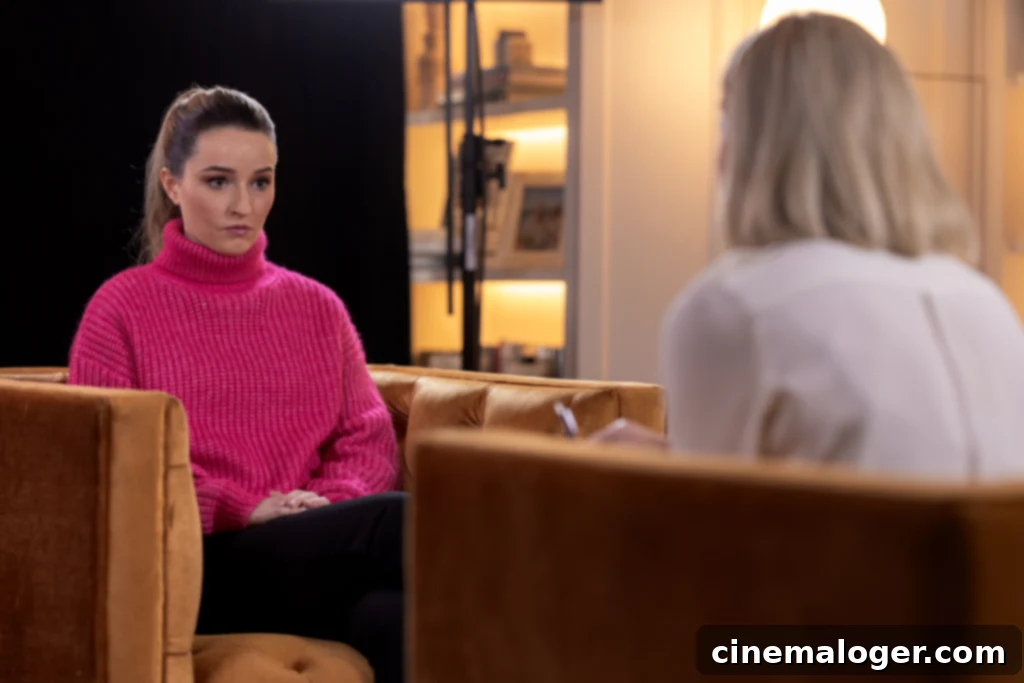Apple Cider Vinegar Miniseries: Unmasking the True Story Behind the Wellness Scam and How to Watch It
Prepare to delve into a captivating new miniseries that pulls back the curtain on the alarming world of wellness scams. Titled Apple Cider Vinegar, this production explores the astonishing true story of a prominent wellness influencer who orchestrated an elaborate deception, falsely claiming that a strict healthy diet and holistic treatments had miraculously cured her terminal brain cancer. This compelling narrative is not just about a lie, but about the societal forces, particularly the burgeoning landscape of early social media, that allowed such a deception to flourish.
If you’re seeking a series that combines dramatic storytelling with a poignant social commentary, then Apple Cider Vinegar might just be your next essential watch. Described as a “true-ish story based on a lie,” the miniseries intricately details the rise and dramatic fall of an influencer who leveraged the trust of her followers. She fabricated a severe illness, faked a miraculous recovery attributed to a specialized diet – one she conveniently happened to be marketing and selling – and built a substantial empire on this foundation of deceit.
While the astonishing tale of Belle Gibson, the real-life inspiration behind the miniseries, has garnered significant media attention in the past, this new production offers a fresh and incisive perspective. It goes beyond the sensational headlines, meticulously diving into the nascent days of Instagram and the foundational role social media played in shaping the rapid ascent of modern wellness culture. Viewers will gain insight into how a platform designed for sharing personal moments inadvertently became a fertile ground for misinformation and exploitation, particularly in the health and lifestyle spheres.
This article will guide you through everything you need to know about this highly anticipated series, including its real-life origins, the talented cast bringing the story to life, and crucially, where and how you can watch Apple Cider Vinegar.
Who Is the Apple Cider Vinegar Miniseries Based On?
At the heart of the Apple Cider Vinegar miniseries is the deeply controversial figure of Belle Gibson, a former Australian wellness influencer whose story shocked the world. Once revered as a beacon of health and a wellness guru, Gibson’s carefully constructed public persona crumbled under the weight of her own fabrications. She gained widespread fame and a massive following by falsely asserting that she had successfully cured various forms of cancer through a strict regimen of diet, exercise, and alternative medicine, captivating an audience eager for hope and unconventional solutions.
Gibson’s deception was extensive and deeply personal. She concocted elaborate narratives about her struggles with multiple aggressive cancers, specifically claiming diagnoses of malignant brain, kidney, and blood cancer. These harrowing tales, often shared with emotional appeals, resonated deeply with her audience. Capitalizing on this manufactured vulnerability and perceived triumph, Gibson rapidly built a thriving fitness and diet empire. Her primary platforms included her highly popular Instagram account, @healing_belle, and the successful launch of both an app and a book, both collectively titled The Whole Pantry. These ventures not only cemented her status as a wellness authority but also generated significant financial profit, all while perpetuating a dangerous and unfounded narrative about health and healing.

The intricate web of Gibson’s lies began to unravel in 2015. Australian journalists Beau Donelly and Nick Toscano played a pivotal role in exposing her deception. Their investigative work initially focused on Gibson’s claims of donating a significant portion of her business profits to various charities. When these donations were found to be largely non-existent or significantly exaggerated, public trust began to erode. This initial revelation served as the crucial thread that, once pulled, led to the full exposure of her broader deceit, including the shocking truth that she had entirely fabricated her cancer diagnoses and even lied about her age.
The consequences for Gibson were severe and far-reaching. In 2017, she faced significant legal repercussions, culminating in fines exceeding $400,000, as reported by PEOPLE magazine. These penalties were imposed for breaching consumer laws, specifically for engaging in misleading and deceptive conduct. Since the scandal broke and the legal proceedings concluded, Gibson has largely retreated from public life, reportedly maintaining a low profile even after law enforcement conducted a raid on her home in connection with the outstanding fines. Her story remains a stark warning about the dangers of unchecked wellness claims and the pervasive nature of online deception.
The Rise and Fall of a Wellness Empire Built on Lies
Belle Gibson’s ascent to wellness stardom was meteoric. In an era where social media was rapidly changing how individuals sought and shared information, particularly concerning health, her narrative offered a compelling blend of personal triumph over adversity and actionable advice. Her Instagram feed was meticulously curated, showcasing a vibrant, healthy lifestyle that seemed to defy the grim reality of a terminal illness. She promoted a raw, vegan diet and a range of alternative therapies, often framing them as potent, natural alternatives to conventional medical treatments.
The appeal of The Whole Pantry app and book was undeniable. They offered recipes, lifestyle tips, and personal anecdotes, all reinforcing the idea that individuals could take control of their health destiny, even in the face of a seemingly insurmountable challenge like cancer. Many followers, drawn in by Gibson’s charisma and the promise of a cure, invested emotionally and financially in her brand. They believed they were supporting a survivor, a beacon of hope who had found a path to healing outside the traditional medical establishment.
However, the foundation of this empire was hollow. The exposure of her lies about charity donations proved to be the Achilles’ heel. This initial unraveling prompted deeper scrutiny, and eventually, the horrifying truth emerged: not only had she not cured cancer, she never had it in the first place. This revelation devastated her followers, many of whom felt deeply betrayed, having invested their trust, time, and money into her fabricated journey. The scandal ignited a global conversation about the ethics of online influencing, the vulnerability of those seeking alternative health solutions, and the critical need for skepticism in the digital age.
Who Portrays Belle Gibson in the Miniseries?
Bringing the complex and controversial character of Belle Gibson to the screen is the talented actress Kaitlyn Dever. Dever has garnered significant critical acclaim for her versatile performances across a range of films and miniseries. Her notable roles include her powerful portrayal in Dopesick, the period comedy Rosaline, the suspenseful thriller No One Will Save You, and her anticipated appearance in season 2 ofThe Last of Us. Her ability to embody characters with depth and nuance makes her an intriguing choice to tackle the challenging role of Gibson.
Dever shared insights into her preparation for Apple Cider Vinegar during an interview with Netflix’s official content hub, The Tudum. She revealed a personal connection to the subject matter, stating that she “holds the wellness world so close” to her heart. This personal understanding likely allowed her to approach the role with a nuanced perspective, recognizing both the positive intentions and the potential pitfalls within the wellness industry.
In her comments, Dever emphasized the show’s profound ability to illuminate the intricate and often confusing dynamics between the medical establishment and the burgeoning wellness industry. She highlighted how the series explores the deeply human aspect of deceit, pondering “human behavior and why we lie.” Dever further elaborated on the gravity of the story, noting that it “does have very high stakes and feels very life and death.” Her remarks underscore the miniseries’ ambition to not merely recount a scandal but to delve into the psychological complexities of the perpetrator and the broader societal implications of such an elaborate fraud.
Kaitlyn Dever’s Challenge: Portraying a Controversial Figure
Playing a real-life figure, especially one as polarizing as Belle Gibson, presents unique challenges for an actor. Dever’s previous roles have often showcased her talent for conveying vulnerability, resilience, and complex emotional states. In Apple Cider Vinegar, she must navigate the delicate balance of portraying a character who was both charismatic and deeply manipulative. The series aims to explore not just *what* Gibson did, but *why*, digging into the motivations that might drive someone to such extreme lengths. This requires an actor to find the humanity within the character, even when their actions are reprehensible, without condoning the behavior.
Dever’s dedication to understanding the nuances of the wellness world and the psychological underpinnings of deception suggests a thoughtful and immersive approach to the role. Her performance is anticipated to be a central pillar of the miniseries, offering viewers a window into the mind of an individual who captivated millions with a lie, and the devastating impact of that betrayal on both individuals and the wider public trust.
Where to Watch Apple Cider Vinegar
Fans eager to watch this compelling miniseries will be pleased to know that Apple Cider Vinegar will be exclusively available on Netflix, the global streaming giant. Mark your calendars, as the highly anticipated first episode is scheduled for release on February 6, 2025. The miniseries is structured to provide a comprehensive and detailed account of Belle Gibson’s story, comprising six episodes in total. Each episode is approximately one hour long, allowing for a deep dive into the narrative without rushing key developments or character arcs.
Netflix’s choice to host Apple Cider Vinegar further cements its reputation for delivering high-quality, thought-provoking true-crime and biographical dramas. The platform’s expansive reach means that this important story, with its lessons on skepticism, media literacy, and the dangers of online misinformation, will be accessible to a vast international audience. Prepare for an immersive viewing experience that promises to be both captivating and deeply unsettling, prompting viewers to reflect on the nature of truth, trust, and influence in the digital age.
Trailer for Apple Cider Vinegar
For those who wish to get a sneak peek into the world of Apple Cider Vinegar and witness the captivating performances and dramatic tension the miniseries promises, a trailer is available. The trailer offers a glimpse into the production’s stylistic choices, the intense atmosphere, and the compelling performances that will bring Belle Gibson’s infamous story to life. It’s an excellent way to get a sense of the series’ tone and narrative approach before its full release on Netflix.
The Enduring Impact of Wellness Scams
The story of Belle Gibson, as retold in Apple Cider Vinegar, serves as a powerful cautionary tale about the pervasive nature of wellness scams in the modern era. In a world saturated with information and self-proclaimed experts, distinguishing credible advice from dangerous misinformation has become increasingly difficult. The allure of quick fixes, natural remedies, and miraculous cures can be particularly strong for individuals facing serious health challenges, making them vulnerable to charismatic figures who exploit their desperation.
This miniseries not only chronicles a specific instance of deception but also encourages a broader discussion about media literacy, critical thinking, and the ethical responsibilities of those who wield influence online. It highlights the importance of consulting qualified medical professionals and scrutinizing health claims, regardless of their source or popularity. As we move forward, stories like Gibson’s underscore the need for greater transparency and accountability in the wellness industry, ensuring that hope is not sold under false pretenses.
